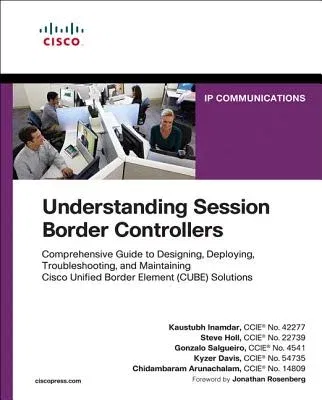The complete guide to deploying and operating SBC solutions, Including
Cisco Unified Border Element (CUBE)
Enterprise and service provider networks are increasingly adopting SIP
as the guiding protocol for session management, and require leveraging
Session Border Controller (SBC) technology to enable this transition.
Thousands of organizations have made the Cisco Unified Border Element
(CUBE) their SBC technology of choice.
Understanding Session Border Controllers gives network professionals
and consultants a comprehensive guide to SBC theory, design, deployment,
operation, security, troubleshooting, and more. Using CUBE-based
examples, the authors offer insights that will be valuable to technical
professionals using any SBC solution.
The authors thoroughly cover native call control protocols, SBC
behavior, and SBC's benefits for topology abstraction, demarcation and
security, media, and protocol interworking. They also present practical
techniques and configurations for achieving interoperability with a wide
variety of collaboration products and solutions.
- Evaluate key benefits of SBC solutions for security, management, and
interoperability
- Master core concepts of SIP, H.323, DTMF, signaling interoperability,
call routing, fax/modem over IP, security, media handling, and
media/signal forking in the SBC context
- Compare SBC deployment scenarios, and optimize deployment for your
environment
- Size and scale an SBC platform for your environment, prevent
oversubscription of finite resources, and control cost through careful
licensing
- Use SBCs as a back-to-back user agent (B2BUA) to interoperate between
asymmetric VoIP networks
- Establish SIP trunking for PSTN access via SBCs
- Interoperate with call servers, proxies, fax servers, ITSPs, redirect
servers, call recording servers, contact centers, and other devices
- Secure real-time communications over IP
- Mitigate security threats associated with complex SIP deployments
- Efficiently monitor and manage an SBC environment

